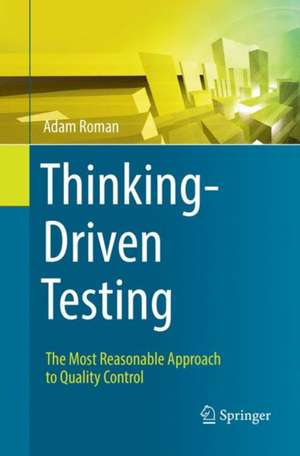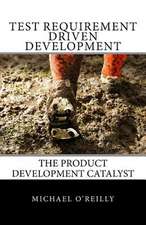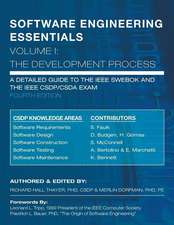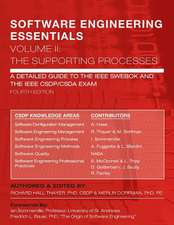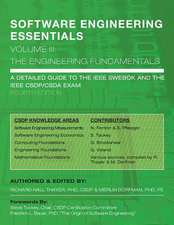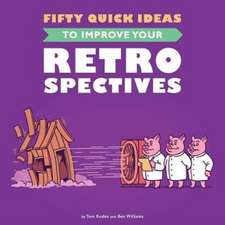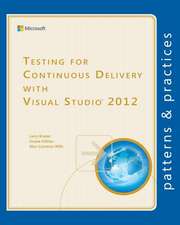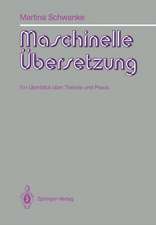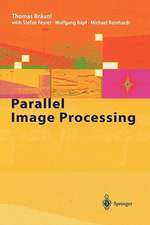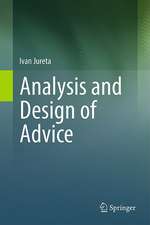Thinking-Driven Testing: The Most Reasonable Approach to Quality Control
Autor Adam Romanen Limba Engleză Paperback – 4 ian 2019
This book presents a new paradigm of software testing by emphasizing the role of critical thinking, system thinking and rationality as the most important skills for the tester. It thus approaches software testing from a different perspective than in past literature, as the vast majority of books describe testing in the context of specific tools, automation, documentation, particular test design techniques or test management. In addition, the book proposes a novel meta-approach for designing effective test strategies, which is based on recent advances in psychology, economics, system sciences and logic.
Chapter 1 starts by introducing the fundamental ideas underlying software testing. Chapter 2 then describes meta-strategies in software testing, i.e. general approaches that can be adapted to many different situations that a software tester encounters. Next, Chapter 3 presents the concept of Thinking-Driven Testing (TDT). This approach utilizes the conceptsdiscussed in the two previous chapters and introduces the main ideas that underlie a reasonable and optimal approach to software testing. Chapter 4 builds on this basis and proposes a specific approach to testing, called TQED, that makes it possible to increase creativity in the context of delivering effective, optimal test ideas. Chapter 5 provides an overview of different types of testing techniques in order to understand the fundamental concepts of test design, while Chapter 6 details various pitfalls a tester may encounter and that can originate from a wide range of testing process areas. Lastly, Chapter 7 puts all this into practice, as it contains several exercises that will help testers develop a number of crucial skills: logical thinking and reasoning, thinking out of the box, creativity, counting and estimating, and analytical thinking.
By promoting critical, rational and creative thinking, this book invites readers to re-examine common assumptions regarding software testing and shows them how to become professional testers who bring added value to their company.
| Toate formatele și edițiile | Preț | Express |
|---|---|---|
| Paperback (1) | 334.20 lei 6-8 săpt. | |
| Springer International Publishing – 4 ian 2019 | 334.20 lei 6-8 săpt. | |
| Hardback (1) | 482.80 lei 6-8 săpt. | |
| Springer International Publishing – 27 mar 2018 | 482.80 lei 6-8 săpt. |
Preț: 334.20 lei
Preț vechi: 417.75 lei
-20% Nou
Puncte Express: 501
Preț estimativ în valută:
63.97€ • 69.51$ • 53.77£
63.97€ • 69.51$ • 53.77£
Carte tipărită la comandă
Livrare economică 21 aprilie-05 mai
Preluare comenzi: 021 569.72.76
Specificații
ISBN-13: 9783030103316
ISBN-10: 3030103315
Pagini: 305
Ilustrații: XXV, 305 p. 84 illus., 7 illus. in color.
Dimensiuni: 155 x 235 mm
Greutate: 0.47 kg
Ediția:Softcover reprint of the original 1st ed. 2018
Editura: Springer International Publishing
Colecția Springer
Locul publicării:Cham, Switzerland
ISBN-10: 3030103315
Pagini: 305
Ilustrații: XXV, 305 p. 84 illus., 7 illus. in color.
Dimensiuni: 155 x 235 mm
Greutate: 0.47 kg
Ediția:Softcover reprint of the original 1st ed. 2018
Editura: Springer International Publishing
Colecția Springer
Locul publicării:Cham, Switzerland
Cuprins
1 Fundamentals of Software Testing.- 2 Testing strategies – how to become a better tester?.- 3 Thinking-Driven Testing: a universal testing framework.- 4 TQED model.- 5 Testing techniques.- 6 Testing pitfalls and how to avoid them.- 7 Kata and exercises for testers.
Notă biografică
Adam Roman is a professor of computer science at the Jagiellonian University in Krakow, Poland, and also a both ASQ and ISTQB certified quality engineer and software tester. His research interests include software quality, model-based testing, effective test case design, test process improvement and application of AI techniques in testing. He also is a recognized expert in the field of software testing, speaker at many Polish testing conferences, and a member of the Polish Society for Quality of Informatics Systems.
Textul de pe ultima copertă
This book presents a new paradigm of software testing by emphasizing the role of critical thinking, system thinking and rationality as the most important skills for the tester. It thus approaches software testing from a different perspective than in past literature, as the vast majority of books describe testing in the context of specific tools, automation, documentation, particular test design techniques or test management. In addition, the book proposes a novel meta-approach for designing effective test strategies, which is based on recent advances in psychology, economics, system sciences and logic.
Chapter 1 starts by introducing the fundamental ideas underlying software testing. Chapter 2 then describes meta-strategies in software testing, i.e. general approaches that can be adapted to many different situations that a software tester encounters. Next, Chapter 3 presents the concept of Thinking-Driven Testing (TDT). This approach utilizes the conceptsdiscussed in the two previous chapters and introduces the main ideas that underlie a reasonable and optimal approach to software testing. Chapter 4 builds on this basis and proposes a specific approach to testing, called TQED, that makes it possible to increase creativity in the context of delivering effective, optimal test ideas. Chapter 5 provides an overview of different types of testing techniques in order to understand the fundamental concepts of test design, while Chapter 6 details various pitfalls a tester may encounter and that can originate from a wide range of testing process areas. Lastly, Chapter 7 puts all this into practice, as it contains several exercises that will help testers develop a number of crucial skills: logical thinking and reasoning, thinking out of the box, creativity, counting and estimating, and analytical thinking.
By promoting critical, rational and creative thinking, this book invites readers to re-examine common assumptions regarding software testing and shows them how to become professional testers who bring added value to their company.
Caracteristici
Presents a new paradigm of software testing by emphasizing the role of critical thinking, system thinking and rationality as the most important skills for the tester Proposes a novel meta-approach for designing effective test strategies, which is based on recent advances in psychology, economy, system sciences, and logic Invites readers to re-examine common assumptions regarding software testing and shows them how to add value to their company
